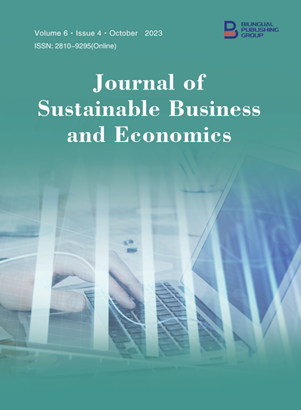-
227
-
187
-
144
-
138
-
134
How Corporate Social Responsibility Impacts Employee Identification, Psychological Benefit, and Customer Orientation in Hospitality Industry?
DOI:
https://doi.org/10.30564/jsbe.v6i4.5778Abstract
The literature supports the notation that corporate social responsibility (CSR) plays a vital role in engaging consumers and establishing strong relationships with the organizations. However, CSR needs to be comprehensively studied as internal marketing to motivate employees to improve customer services by fulfilling their needs. Accordingly, the current study determines the impact of CSR congruence and efficacy on employee-customer identification, psychological benefit, and customer orientation in the hospitality industry of Pakistan. The data from 276 frontline employees were collected using a purposive sampling technique through self-administered questionnaires and structural equation modeling was used to test the research hypotheses. The results found that perceived CSR congruence has a stronger impact on employee-customer identification, while CSR efficacy has a relatively stronger relationship with psychological job benefits and customer orientation. This study provides a significant contribution to the extant literature on using CSR as an internal marketing strategy to improve the frontline employees’ ability to satisfy external stakeholders, i.e., customers.
Keywords:
CSR; Employee-customer identification; Hospitality industryReferences
[1] Sergeeva, N., Kapetanaki, E., 2022. Corporate social responsibility as a strategic narrative: The cases of UK project-based organisations. Project Leadership and Society. 3, 100073.
[2] Liyanage, S.I.H., 2022. Associated problem with greening universities. Producing green knowledge and innovation: A framework for greening universities. Springer International Publishing: Cham. pp. 1-24.
[3] Trudel, R., Cotte, J., 2008. Does being ethical pay. Wall Street Journal. 1.
[4] Bhattacharya, C.B., Sen, S., Korschun, D., 2007. Corporate social responsibility as an internal marketing strategy. Sloan Management Review. 49(1), 1-29.
[5] Berger, I.E., Cunningham, P.H., Drumwright, M.E., 2007. Mainstreaming corporate social responsibility: Developing markets for virtue. California Management Review. 49(4), 132-157.
[6] Ishaq, M.I., Sarwar, H., Franzoni, S., et al., 2023. The nexus of human resource management, corporate social responsibility and sustainable performance in upscale hotels: A mixed-method study. International Journal of Emerging Markets.
[7] Aguilera, R.V., Aragón-Correa, J.A., Marano, V., et al., 2021. The corporate governance of environmental sustainability: A review and proposal for more integrated research. Journal of Management. 47(6), 1468-1497.
[8] Ishaq, M.I., Sarwar, H., Azeez Ansari, A., et al., 2022. The red and green signals for industrial salesforce: testing an integrated framework. Journal of Business & Industrial Marketing. 37(12), 2453-2467.
[9] Sarwar, H., Ishaq, M.I., Franzoni, S., 2022. Influence of HRM on CSR and performance of upscale hotels in developed and developing countries. Environment, Development and Sustainability. 1-23.
[10] Rhou, Y., Singal, M., 2020. A review of the business case for CSR in the hospitality industry. International Journal of Hospitality Management. 84, 102330.
[11] Sen, S., Bhattacharya, C.B., Korschun, D., 2006. The role of corporate social responsibility in strengthening multiple stakeholder relationships: A field experiment. Journal of the Academy of Marketing Science. 34(2), 158-166.
[12] Tajfel, H., Turner, J.C., 2004. The social identity theory of intergroup behavior. Political psychology. Psychology Press: London. pp. 276-293.
[13] Caprar, D.V., Walker, B.W., Ashforth, B.E., 2022. The dark side of strong identification in organizations: A conceptual review. Academy of Management Annals. 16(2), 759-805.
[14] Franzoni, S., Sarwar, H., Ishaq, M.I., 2021. The mediating role of HRM in the relationship between CSR and performance in the hospitality industry. Sustainability. 13(24), 13699.
[15] Homan, A.C., Gündemir, S., Buengeler, C., et al., 2020. Leading diversity: Towards a theory of functional leadership in diverse teams. Journal of Applied Psychology. 105(10), 1101.
[16] Ahearne, M., Mathieu, J., Rapp, A., 2005. To empower or not to empower your sales force? An empirical examination of the influence of leadership empowerment behavior on customer satisfaction and performance. Journal of Applied psychology. 90(5), 945.
[17] Anderson, E., Onyemah, V., 2006. How right should the customer be?. Harvard Business Review. 84(7-8), 58-67.
[18] Sarwar, H., Ishaq, M.I., Amin, A., et al., 2020. Ethical leadership, work engagement, employees’ well-being, and performance: A cross-cultural comparison. Journal of Sustainable Tourism. 28(12), 2008-2026.
[19] Mukherjee, A., Sarkar, S., Chakraborty, M., et al., 2021. Occurrence, predictors and hazards of elevated groundwater arsenic across India through field observations and regional-scale AI-based modeling. Science of the Total Environment. 759, 143511.
[20] Bakker, A.B., de Vries, J.D., 2021. Job Demands-Resources theory and self-regulation: New explanations and remedies for job burnout. Anxiety, Stress, & Coping. 34(1), 1-21.
[21] Yao, Z., Zhang, X., Luo, J., et al., 2020. Offense is the best defense: the impact of workplace bullying on knowledge hiding. Journal of Knowledge Management. 24(3), 675-695.
[22] Hartmann, S., Weiss, M., Newman, A., et al., 2020. Resilience in the workplace: A multilevel review and synthesis. Applied Psychology. 69(3), 913-959.
[23] Koc, E., 2019. Service failures and recovery in hospitality and tourism: A review of literature and recommendations for future research. Journal of Hospitality Marketing & Management. 28(5), 513-537.
[24] Sinclair, R.R., Allen, T., Barber, L., et al., 2020. Occupational health science in the time of COVID-19: Now more than ever. Occupational Health Science. 4, 1-22.
[25] Elsbach, K.D., Kramer, R.M., 1996. Members’ responses to organizational identity threats: Encountering and countering the Business Week rankings. Administrative Science Quarterly. 442-476.
[26] Van Pinxteren, M.M., Pluymaekers, M., Lemmink, J.G., 2020. Human-like communication in conversational agents: A literature review and research agenda. Journal of Service Management. 31(2), 203-225.
[27] Lingens, B., Miehé, L., Gassmann, O., 2021. The ecosystem blueprint: How firms shape the design of an ecosystem according to the surrounding conditions. Long Range Planning. 54(2), 102043.
[28] Islam, T., Islam, R., Pitafi, A.H., et al., 2021. The impact of corporate social responsibility on customer loyalty: The mediating role of corporate reputation, customer satisfaction, and trust. Sustainable Production and Consumption. 25, 123-135.
Downloads
How to Cite
Issue
Article Type
License
Copyright © 2023 Rameesha Abbas, Ahsan Siddiqui, Kashif Saleem

This is an open access article under the Creative Commons Attribution 4.0 International License.




 Rameesha Abbas
Rameesha Abbas

